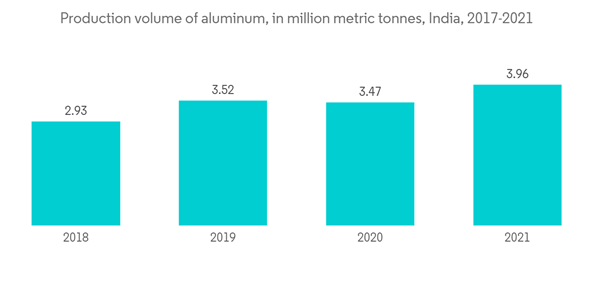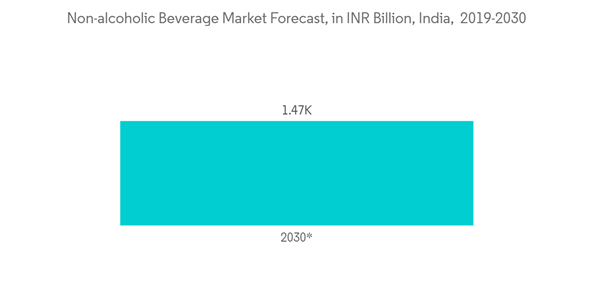Key Highlights
- Increased urbanization is one of the significant reasons that are prompting companies to increase metal cans and container production capacity. Moreover, the penetration of organized retail is also compelling market players to ramp up their capacity.
- Tin and aluminum are the two different types of metal cans available in the market. Beer and other alcoholic beverages are often packaged in aluminum cans, whereas all other goods and juices are packaged in tin cans. The food processing sector in India is heavily pushed by the government and has the potential to contribute significantly.
- The high recyclability of metal cans is one of the significant drivers for the market's growth. Aluminum cans deliver protection against moisture. They do not rust and are resistant to corrosion, as well as provide one of the most extended shelf lives than any other packaging. It also offers many benefits, such as rigidity, stability, and high barrier properties.
- Despite India being the third largest producer and consumer of aluminum globally, the penetration of aluminum in the packaging segment is lower than the global average owing to high costs. There could be a potential proliferation in the packaging sector with growing health consciousness owing to aluminum’s hygienic properties and the boom in the pharmaceutical industries. According to CRISIL, as of 2020, the demand from the packaging segment for primary and secondary aluminum (i.e., recycled aluminum) volumes were 6-8% and 6-7%, respectively.
- The demand for can-packed products, especially food and beverage products, is expected to rise sharply due to the increasing emphasis on recycling and sustainable solutions. India has a very low can consumption compared to other countries. According to Ball Beverage Packaging, per capita can consumption in India is approximately one per annum, while it is nearly 40 in China and about 70 in Vietnam. Consumer behavior and safety concerns in the wake of the COVID-19 pandemic were fueling the demand for aluminum cans in India.
India Metal Cans Market Trends
Aluminum Cans to Show Significant Growth Rate
- One of the major elements affecting the market's usage of aluminum cans is the material's potential to be recycled. Nearly all aluminum cans are recyclable. The most recycled packaging on a global scale is aluminum and metal cans. As aluminum cans can be recycled at the end of their use without losing quality, businesses from various sectors, including the plastic and paper industries, prefer to use them as packaging.
- One aluminum can recycled can save energy equivalent to three hours of television. India's consumption rates are gradually increasing due to a growing middle-income group population, shifting lifestyles, and changing consumer tastes.
- According to a recent study by the Energy and Resources Institute (TERI), when compared to alternative packaging materials, including polyethylene terephthalate (PET), glass, and multi-layer plastic, aluminum cans are the most eco-friendly method of beverage packaging.
- The Government of India is also taking initiatives to lower the prices of raw materials and increase domestic availability. For instance, in May 2022, the Government of India waived customs duty on the import of some raw materials, including ferronickel and coking coal, used by the steel industry. This development will lower the cost for the domestic industry and reduce the prices. In addition to this, the duty on exports of iron ore was increased up to 50%, and on a few steel intermediaries to 15%. Developments like these that are undertaken by private and government organizations are drivers for metal packaging, such as metal cans and containers in India.
Growing Demand from Food and Beverage Industry
- The demand for convenience food has increased as a result of the nation's increasing pace of urbanization. In India, eating out and convenience food have supplanted grocery shopping, preparation, and home cooking.
- Many regular consumers of canned foods choose the products due to the convenience offered and lower cost of the products. Canned foods are more convenient to consume and require less energy and time to cook. Most canned foods take 40% less time to prepare than regular meals.
- The growing popularity of energy and sports drinks is the main factor driving the aluminum cans industry in India. Additionally, the design and technological advancements in beverage packaging made by important players are having a big impact on the market. By applying different food-grade lacquers on the cans' exteriors, the major competitors are also concentrating on increasing the aesthetics of their product offers.
- Moreover, price-conscious college students, athletes, and young adults just starting their careers are increasing their consumption of energy drinks, which is forcing high-end overseas firms to pay attention to this market and develop products to compete for their business.
- Global players such as Ball Beverage Packaging are optimistic about India's expanding aluminum packaging market, which is expected to develop significantly as new segments like sparkling water, wine, and hard spirits move into aluminum cans.
- The food sector is one of India's major sectors using metal cans and containers. Steel is used primarily to make rigid cans, whereas aluminum is used to make thin and lightweight cans. Nearly all steel used for cans is coated with a thin layer of tin to inhibit corrosion from the food and is called tin cans. The Indian market is witnessing significant emerging trends catering to the food industry. For instance, India is one of the major exporters of agricultural and processed food products. According to the Ministry of Commerce & Industry, despite COVID-19 restrictions, particularly owing to the second wave of the pandemic, agricultural and processed food product exports achieved a robust increase of 44.3% in 2021-22 (April-June) compared to the corresponding period in 2020-21. The significant increase in agricultural and processed food exports during the first three months of 2021 is a continuation of the growth in exports seen in the fiscal year 2020-21.
- The robust export activities of the country also created a need for storing processed items, leading to the demand for metal food cans. For instance, according to the Ministry of Commerce and Industry of India, India’s export of final consumer food products, such as Ready to Eat (RTE), Ready to Serve (RTS), and Ready to Cook (RTC), registered significant growth in the last decade. The export of these products registered a CAGR of 10.4% from 2011-12 to 2020-21. This export increased by over 23% to USD 1,011 million from April to October (2021-22) compared to USD 823 million reported from April to October (2020-21).
India Metal Cans Market Competitor Analysis
The Indian metal cans market is quite competitive. It is moderately fragmented and consists of significant individual players, such as Ball India (Ball Corporation), Oricon Enterprises Limited, Casablanca Industries Pvt Ltd, and Hindustan Tin Works Ltd. Many companies are increasing their market presence by expanding their operations or entering into strategic mergers and acquisitions.- Zenith Tins Pvt. Ltd, an ISO 22000 (Food Safety) & ISO 9001 (Quality Assurance) certified company engaged in manufacturing and exporting high-quality printed tin cans. It uses machinery from Soudronic (Switzerland) and Mechnelonic and Mercury (India) to make its product stand out from others. Additionally, the company’s high-speed offset metal decorating machine from Japan can print up to a whopping 7,500 sheets an hour, which is about 125 sheets each minute. This allows the company to adapt if customer demand changes in India rapidly.
Additional benefits of purchasing the report:
- The market estimate (ME) sheet in Excel format
- 3 months of analyst support
This product will be delivered within 2 business days.
Table of Contents
Companies Mentioned (Partial List)
A selection of companies mentioned in this report includes, but is not limited to:
- Ball Corporation
- Asian Aerosol Group
- Can-Pack SA
- Crown Holdings Inc.
- Silgan Containers LLC
- Hindustan Tin Works Ltd
- Kaira Can Company Limited
- Shetron Limited
- Casablanca Industries Pvt. Ltd
- Oricon Enterprises Limited










